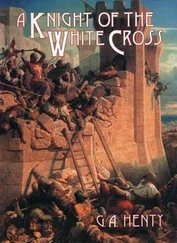George Henty - A Knight of the White Cross - A Tale of the Siege of Rhodes
Здесь есть возможность читать онлайн «George Henty - A Knight of the White Cross - A Tale of the Siege of Rhodes» — ознакомительный отрывок электронной книги совершенно бесплатно, а после прочтения отрывка купить полную версию. В некоторых случаях можно слушать аудио, скачать через торрент в формате fb2 и присутствует краткое содержание. Жанр: foreign_children, foreign_antique, foreign_prose, на английском языке. Описание произведения, (предисловие) а так же отзывы посетителей доступны на портале библиотеки ЛибКат.
- Название:A Knight of the White Cross: A Tale of the Siege of Rhodes
- Автор:
- Жанр:
- Год:неизвестен
- ISBN:нет данных
- Рейтинг книги:5 / 5. Голосов: 1
-
Избранное:Добавить в избранное
- Отзывы:
-
Ваша оценка:
- 100
- 1
- 2
- 3
- 4
- 5
A Knight of the White Cross: A Tale of the Siege of Rhodes: краткое содержание, описание и аннотация
Предлагаем к чтению аннотацию, описание, краткое содержание или предисловие (зависит от того, что написал сам автор книги «A Knight of the White Cross: A Tale of the Siege of Rhodes»). Если вы не нашли необходимую информацию о книге — напишите в комментариях, мы постараемся отыскать её.
A Knight of the White Cross: A Tale of the Siege of Rhodes — читать онлайн ознакомительный отрывок
Ниже представлен текст книги, разбитый по страницам. Система сохранения места последней прочитанной страницы, позволяет с удобством читать онлайн бесплатно книгу «A Knight of the White Cross: A Tale of the Siege of Rhodes», без необходимости каждый раз заново искать на чём Вы остановились. Поставьте закладку, и сможете в любой момент перейти на страницу, на которой закончили чтение.
Интервал:
Закладка:
CHAPTER V SCOURGES OF THE SEA
Breathless and faint from their tremendous exertions, the knights removed their helmets.
“By St. Mary,” Sir Louis said, “this has been as hard a fight as I have ever been engaged in, and well may we be content with our victory! Well fought, my brave comrades! Each of these vessels must have carried twice our number at least, and we have captured four of them; but I fear the cost has been heavy.”
Seven knights had fallen, struck down by sword, arrow, or thrust of spear. Of the rest but few had escaped unwounded, for, strong as was their armour, the keen Damascus blades of the Moslems had in many cases cut clean through it, and their daggers had found entry at points where the armour joined; and, now that the fight was over, several of the knights sank exhausted on the deck from loss of blood.
But the dressing of wounds formed part of a knight of St. John’s training. Those who were unwounded unbuckled the armour and bandaged the wounds. Others fetched wine and water from the galley. The chains of the galley slaves were removed, and these were set to clear the decks of the Moslem corpses. The anchors were dropped, for what little wind there was drifted them towards the shore. They had learned from a dying pirate that the vessels were part of the fleet of Hassan Ali, a fact that added to the satisfaction felt by the knights at their capture, as this man was one of the most dreaded pirates of the Levant. They learnt that he himself had not been present, the expedition being under the command of one of his lieutenants, who had fallen in the fight.
“Now, comrades, let us in the first place take food; we have not broken our fast this morning. Then let us consider what had best be done, for indeed we have got as much in our hands as we can manage; but let us leave that till we eat and drink, for we are faint from want of food and from our exertions. But we shall have to eat what comes to hand, and that without cooking, for our servants all joined the pirates when they boarded us, and are either dead or are ashore there.”
A meal was made of bread and fruit, and this with wine sufficed to recruit their energies.
“It seems to me, comrades,” Sir Louis said, when all had finished, “that the first thing is to search the holds of these vessels and see what valuables are stored there. These may be all carried on board one ship, and the others must be burnt, for it is clear that, as there are four of them, we cannot take them to Rhodes; and even with one and our galley we should fare but ill, if we fell in with two or three more of Hassan’s ships.”
“But how about the pirates on shore, Sir Louis?” a knight asked. “There were very many who could not get off to their ships during the fight, and scores must have swum ashore. I should say that there must be full two hundred, and it will be a grievous thing for the islanders if we leave them there.”
“It is certain,” the commander said, “that we are not strong enough to attack them, for were we to land, a party would have to be left on board, or the pirates might elude our search, seize some fishing boats, and regain possession. Certainly, we are in no position to divide our forces.”
“Methinks,” Sir John Boswell said, “that the best plan would be to send a boat, manned with ten galley slaves, taking two or three of us to the rendezvous, to fetch hither the other two galleys. With their aid we might take all the four ships safe into port, after first clearing the island of these pirates. It is but forty miles away, and eight hours’ rowing would take us there.”
There was a general murmur of assent, for all wished that the trophies of their bravery should, if possible, be carried to Rhodes.
“That will certainly be the best plan, Sir John, though it may detain us here for two or three days, or even more, for it is quite uncertain when the other two galleys may put in at the rendezvous. Will you yourself undertake the mission?”
“With pleasure.”
“How many will you take with you?”
“Two will be sufficient, for we shall have no fighting to do, as we shall have to trust to our speed if we fall in with an enemy. I will take, with your permission, Sir Ralph Harcourt and Sir Gervaise Tresham, both of whom have today fought with distinguished bravery. Indeed, I owe my life to them, for more than once, when I was hotly pressed, they freed me from my assailants. Truly none bore themselves better in the fray than they did.”
Three or four others joined in hearty commendations of the two young knights.
“Indeed,” one said, “I was greatly surprised to see how Tresham bore himself. He is but a lad, with scarce, one would think, strength to hold his own in such a fray. It chanced that he was next to me in the circle, and for a time I kept my eye on him, thinking he might require my aid; but I soon saw that I need not trouble myself on his account, for he wielded his weapon as doughtily as the best knight of the Order could have done, and one of the proofs is that, while most of us bear marks of the conflict, he has escaped without scratch. I trust, Sir Louis, that when you give an account of the fighting you will specially mention that this, the youngest knight of the Order, bore himself as stoutly as any of them. I say this, Sir John, because, not being of your langue, I can speak more warmly than you can do of his skill and bravery.”
“I thank you, De Boysey,” Sir John Boswell said, “and I am proud that my young countryman should have so gained your approbation. And now,” he went on, “while the galley slaves are getting a meal—which they have right well earned today—I should like to see what there is under the hatches of these ships, so that I can give our comrades in the other galleys some idea of the value of this booty we have taken.”
They rose from the table, and, going on board the prizes, lifted the hatches.
“Beware!” De Boysey exclaimed, looking down into the hold, when the first hatch was taken off. “There are people below.”
A chorus of cries followed his exclamation.
“They are the voices of women and children,” Sir Louis exclaimed. “They must be captives.”
This turned out to be so. In the holds of the four ships were found over a hundred and fifty women and children; these had been brought on board in the first boat loads by the pirates, and when the Christian galley had been seen coming round the point, had been thrust below, and the hatches thrown over them. They had heard the din of battle above, but knew not how the conflict had terminated, and, being afraid to cry out, had remained silent until, on the hatch being lifted, they had seen the figures of Christian knights standing in the bright sunshine. All had come from the village on the other side of the island. They related how the pirates had suddenly burst upon them, had slaughtered all the men, set fire to the village, and had driven them before them across the island to the ships. The poor creatures were delighted at their escape from slavery, but at the same time were full of grief at the loss of husbands, fathers, and sons.
Some laughed, others cried; while some thanked God for their rescue others heaped imprecations upon the authors of their misfortunes.
The knights explained to them that for a short time they must remain on board, as half the pirates were still on shore, but that aid would soon arrive that would enable them to clear the island.
Half an hour later Sir John Boswell, with the two young knights, started in a rowing boat, manned by ten of the galley slaves. The wind had sprung up since the fight ceased, and as it was nearly astern, they anticipated that they would make a good passage, and be at the little islet, named as the place of rendezvous, before nightfall.
Читать дальшеИнтервал:
Закладка:
Похожие книги на «A Knight of the White Cross: A Tale of the Siege of Rhodes»
Представляем Вашему вниманию похожие книги на «A Knight of the White Cross: A Tale of the Siege of Rhodes» списком для выбора. Мы отобрали схожую по названию и смыслу литературу в надежде предоставить читателям больше вариантов отыскать новые, интересные, ещё непрочитанные произведения.
Обсуждение, отзывы о книге «A Knight of the White Cross: A Tale of the Siege of Rhodes» и просто собственные мнения читателей. Оставьте ваши комментарии, напишите, что Вы думаете о произведении, его смысле или главных героях. Укажите что конкретно понравилось, а что нет, и почему Вы так считаете.












